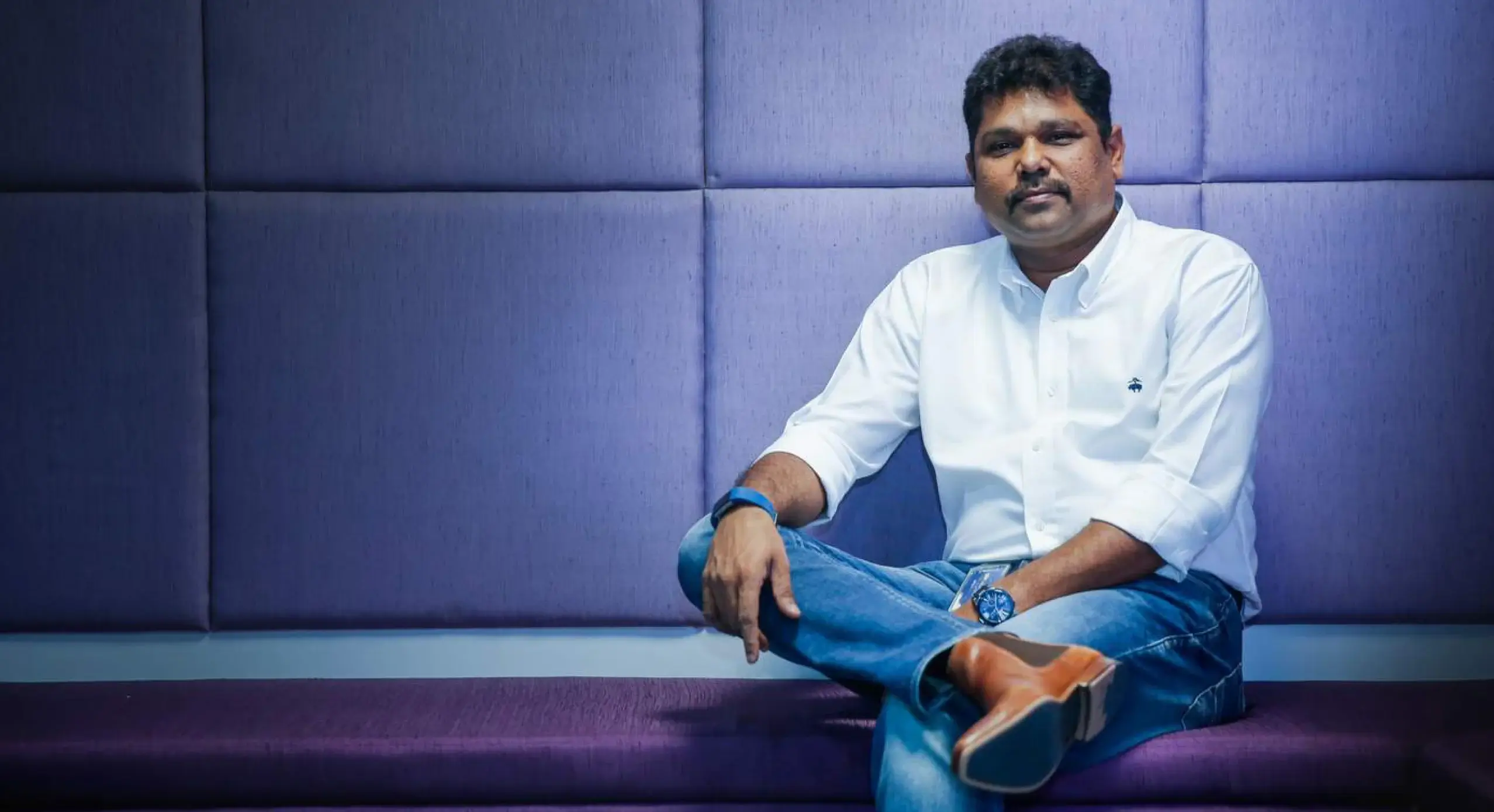How he used lessons from his troubled childhood and early entrepreneurial failures to build Freshdesk, one of India’s fastest growing product startups.
Can he make all this count?
“Girish is like Shrek,” says Shoba Girish.
“If you’re Prince Charming, everybody likes you upfront, but if you look like an ordinary man, especially like Shrek, nobody even bothers,” she says.
“So I call him Shrek. If you know him personally, you will know he is an amazing human being; everybody loves him. I like him,” she says.
Shoba is referring to her husband Girish Mathrubootham. He’s the founder of helpdesk software maker Freshdesk, which looks set to be the most valuable software product company in India in this decade.
For Girish, 42, who hails from the temple town of Tiruchirapalli (also known as Trichy) in south India, the colour of his skin and his “Shrek-like” looks have been the easiest of the battles he has fought over the years. A lonely childhood as he grew up without a mother, early work-life failures, and his own challenges in expressing love for the people he cared for have been some of the tougher battles.
I am meeting 38-year-old Shoba at the couple’s apartment in Raja Annamalai Puram, a quiet tony locality on the banks of the Adyar river in Chennai. If you take the stairs to their apartment, you can’t miss their Maybach S 500 and Volvo V40 in the parking lot. Girish bought his first car, a used Nissan Pathfinder, in 2000, and in the 16 years since, has acquired 15 more including his favourite wheels these days: the Maybach. It’s a Mercedes sub-brand that’s even more premium than the S class.

“My first BMW 5 series is my favourite as it was my first luxury car and I really enjoyed driving it. My top speed was 223 km/hr,” says Girish, with the grin of a 10-year-old boy.
As Shrek said in the 2001 animation blockbuster, ogres are like onions. And like onions, they have layers over layers. Girish’s life, too, is multilayered.
This story is about how Girish used lessons from his troubled childhood and early entrepreneurial failures to build one of India’s fastest growing product startups, set to top $1 billion in valuation this year.
Now, as he prepares to take the five-year-old Freshdesk public, or even sell it off in a potential multibillion dollar deal, Girish faces the toughest battle of his life. The stakes are high, and the expectations are rising all the time. He has to steer Freshdesk through this crucial phase — what experts call “the valley of death” for startups.
“It’s our game to lose,” Girish tells me.
Product Nation Hero
Freshdesk, which started out in October 2010 and lived through the cycles of ecommerce boom (and the bust), is the posterchild for every software-as-a-service (SaaS) startup founder in India. Girish gets demigod treatment when he is in their midst.Since it was launched with $1 million funding from Accel Partners, Freshdesk has raised $149 million in total so far. According to company insiders and people familiar with the board’s thinking, Freshdesk has plans to raise its next round funding at a valuation of over $1 billion and eventually list its shares on a US stock exchange.“Do you realise that there’s never been a tech product IPO from India globally? We can be the first one. That is the dream,” says Girish. “We want to do a multibillion-dollar IPO, and it’s probably two-three years away if everything goes as per plan.” Together with his cofounder Shan Krishnasamy, he owns about 20% of the company.
Freshdesk in numbers
| 750 mn | Company Value |
| 60 mn | Annual Revenues |
| 1 bn | Aimed Valuation for the year |
| 2 yrs | preparation period for multi-billion IPO, the first for any product software startup from India. |
| 149 mn | Raised from 4 investors including Accel, Google Capital and Sequoia since 2011 |
Valued at $750 million during its last funding of $55 million last November, Freshdesk’s business proposition is simple: it helps companies such as GE Aviation, Honda and Cisco manage their customer helpdesks across web, phone, email and social platforms. These are the marquee names among Freshdesk’s client roster; the others are mostly small and medium businesses (SMBs). In India, it serves online eyewear store Lenskart.com and Paytm.
“There’s a good 70% chance that a Google, Oracle or Salesforce.com could make an acquisition bid before the IPO,” says an executive at one of the Freshdesk investors. The bid will likely be in the nine digits range and, if it goes through, a first-of-its-kind buyout of an Indian software product company.
Since August last year, when I first started interviewing Girish for this profile, we had not met outside his office in Chennai, not even once.
A breezy February meeting at a Delhi pub gave me just what I wanted: I saw Girish among his peers in his true element. As we walked in to meet a group of half-a-dozen SaaS founders at the terrace pub, there were shouts of joy, hugging and a warm show of camaraderie.
It was almost like a secret cult meeting, though definitely a loud one. Most rockstar founders in India typically have their fan followings in the cities they are based. At this meeting, Girish, earthy as always, seemed to cut through geographic (and language) barriers. He listened intently to the Delhi group of startup founders cracking jokes and sharing anecdotes. The conversation ranged from ailing ecommerce peers to funding and growth strategies to controversies in the ecosystem.
“Forget the demigod status, I am not in awe of him,” insists Ashish Tulsian, founder of restaurant analytics software maker, POSist, based in Delhi. “Girish’s value is that despite being so heavily funded and valued, he plays coach to every SaaS startup.”
According to a Google and Accel Partners report published in 2016, Indian SaaS companies will be valued over $50 billion by year 2025.
Indian SaaS startups led by Fresh Desk and Zoho will earn $10 billion in revenues by year 2025
In Girish’s and Freshdesk’s rise, India’s SaaS founders are seeing the much-missed respect they always felt was due to them but was hijacked by the ecommerce peers. They call themselves the founders of what will be a “Product Nation”, but since October 2010, when Freshdesk was first launched, India’s SaaS startups have been living in the shadow of much larger ecommerce peers. The likes of Flipkart and Snapdeal hogged not just the newspaper headlines but also much of the VC money coming to the Indian entrepreneurial universe.
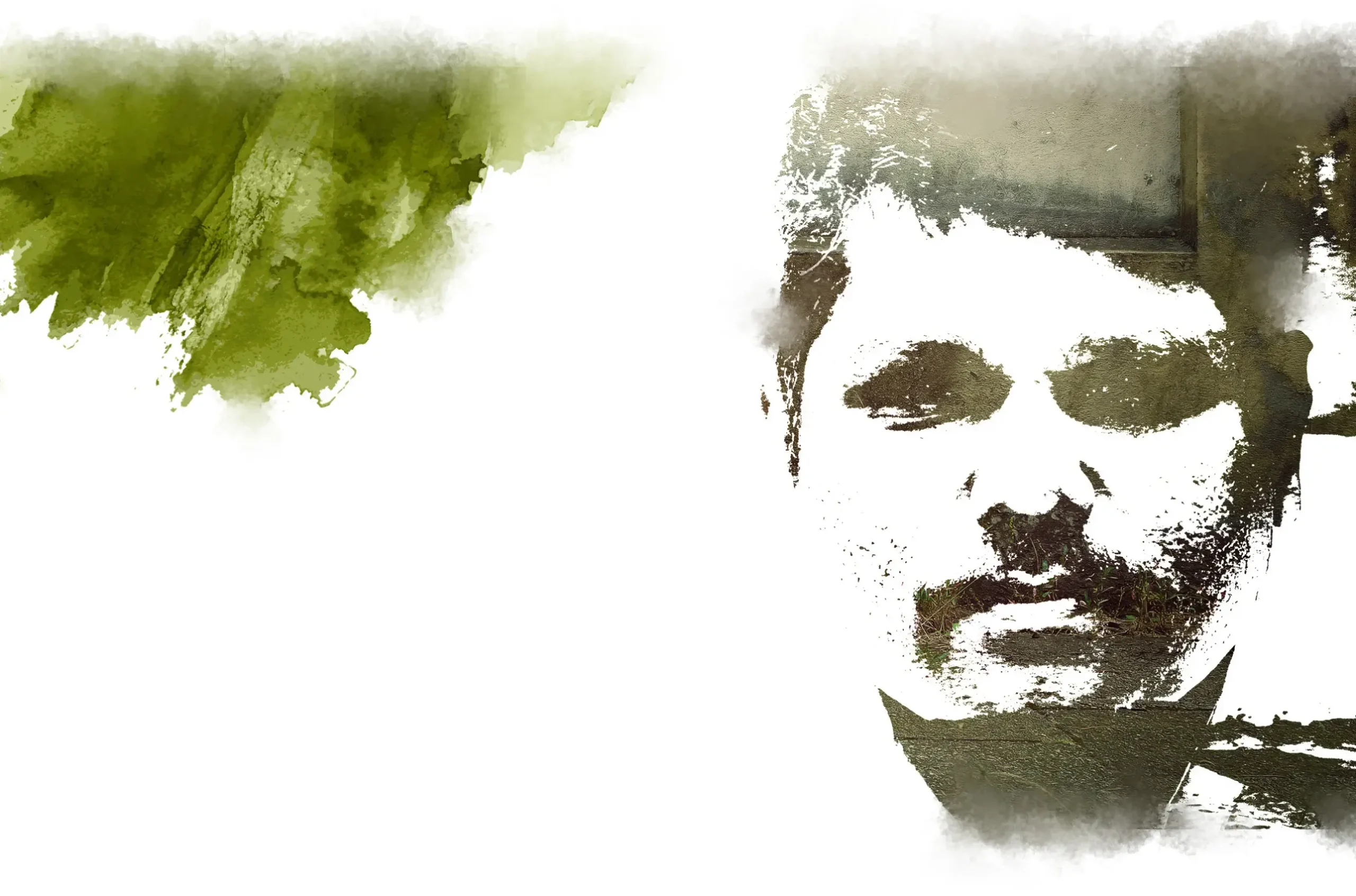
A broken childhood
In his 2008 bestseller, Outliers, Malcolm Gladwell concludes that people turn experts after 10,000 hours of pratice at whatever they are good at — which is about five years of eight hours daily practice five days a week. He narrates the story of Bill Gates, and how his high school in the early 1970s was the only school back then to have a computer. By the time Gates turned 20, he already had 10,000 hours of computer programming hours behind him.
“A big part of who I am today was shaped by multiple factors, much like the story of Bill Gates in ‘Outliers’,” he says, referring to something different from his technology expertise. He’s talking about how his emotional self was put through the wringer in his early years and how it made him stronger. “Life wasn’t easy for me as a child. It was ok till I was 10, 11 years old… Then my father remarried and it transformed me as a person,” he says.
Born in March 1975 and named Rathnagirish Mathrubootham, Girish spent his time like any other kid in his Trichy neighbourhood. At seven, his favourite toy was the “bambaram”, as a top is called in Tamil. “There were eight coconut trees, five mango trees and a papaya tree in our house,” he recalls. “Only monkeys ate papaya back then. But now, thanks to my diabetes, I too have to eat papaya.”
“We used to have ‘street cricket leagues’ on Ramarao Agraharam street near my Trichy home,” he says. Super Mario games at a local video parlour were another draw.
When he was seven, his parents got divorced. Their separation became the first and perhaps the most influential event in Girish’s life.
Three years later, his father, a retired banker, remarried and kept his son with him. For the young Girish, it was too much change, and too soon in his life, to cope with.
“Let’s just say we didn’t get along well,” Girish says of his stepmother, staying away from detail. “I couldn’t understand relationships; I couldn’t accept someone else as my mother.”
“What was basic for others became a big fight for me and it helped me develop survival instincts,” he tells me matter of factly. “In a normal family, you can be assured of a meal when you go home at night. For me, that wasn’t there at all.” I step back and don’t ask more.
Apart from survival instincts, Girish’s childhood experiences also taught him lessons in emotional maturity.
In FactorDaily’s Outliers podcast interview with him, he advises entrepreneurs to be emotionally detached from the startup idea while building it. It’s a lesson he applied much later while fighting rivals such as Zendesk, who accused Freshdesk of being “a ripoff”.
“While arguing at home, I always lost the battle when I reacted to any provocation. Then I started ignoring things, and discovered that it made me calm. I could choose to respond or not,” he says.
The scars still show
While these early experiences turned Girish into a self-made, self-taught professional ready to take on any challenges, they also took away his ability to emote.
“My biggest loss in life has been the ability to show love. Usually, where do you get the ability to show love? From parents. I am better off now, but for a long time I was incapable of showing love,” he says.
His wife Shoba agrees and explains how painful it was for her initially after they got married in October 2002.
“Even after the kids (were born), sometimes I would sit down and cry, wondering how to handle them all by myself. Gradually, I realised, this is how he is — it’s not that he didn’t care, he just couldn’t express himself. Even now, it’s mostly like that, but now I know what he means. It took me years to understand that,” she says. “A mother plays an important role in the life of a person; there needs to be a woman in everyone’s life. He never had that. He didn’t get that affection (of a mother).”
The couple has two sons — Charan (13) and Sanjay (11). Both Girish and Sobha are very particular about how they are raised, and they don’t let them feel any sense of entitlement. Girish learned early in his life that parents who take all the decisions on behalf of their kids end up making them adults who are weak in decision-making.
“I remember some of my friends whose parents used to even decide what will they eat at a restaurant. Today, they are always asking others before making any decisions,” he says. “For me, there was no choice. I had to make my own decisions.”
Perhaps, more than his fair share of decisions. “I was a complete rebel child,” he says. He ran away from home twice. “Once I went and stayed at my school friend’s home. I don’t remember the second time.”
Girish found love in his aunts who lived in his Trichy neighbourhood, especially Seetha, who once took him to meet his mother. He was 20 years old when he decided to make the toughest trip of his life — meeting his mother in Coimbatore, a five-hour bus ride from Trichy.
“I was feeling really nervous; it was an emotional bus journey,” he says.
Seetha, who travelled with him to give him moral support, says Girish had to make the trip at some point in his life, like the character of Karna from the Indian epic ‘Mahabharata’, who goes seeking his mother.

“He couldn’t have continued in life without knowing his mother; I knew him well. So, I took him along to meet her,” she tells me at her first floor residence in Chennai’s Velachery area where we met in January this year. The Coimbatore meeting was not a happy one, and did nothing to heal the scars in young Girish’s mind.
Engineering college happened in 1992. His father took a loan of Rs 75,000 to pay the “capitation fee” — a fee taken by private colleges to auction admissions — at Shanmugha Arts, Science, Technology and Research Academy at Thanjavur.
In college and hostel, Girish faced real-world challenges and learnt how to cope with them. “I believe every kid should be exposed to hostel life because you see real people — some of them will be selfish, others short-tempered, some genuinely nice, talkative or reticent. There is competition for small things like who gets to bathe first and so on, and the damages were small — the risk of failures weren’t big,” he says.
#BFFs and angels
During his engineering and later during his MBA at the University of Madras from 1996 to 1998, Girish made lifelong friends. Two of them — Rajesh Rajasekar and Ravi Raman — backed his failed education venture MindSphere in 2001 before putting money in Freshdesk. The Rs 25,000 each of them put in 2010 in Freshdesk, would now be worth over $2 million (they have sold some parts of it).
Rajasekar, Girish’s friend of 25 years since college, wasn’t in a position to invest money when Freshdesk was launching. His father had passed away a month earlier and there were huge hospital bills to be settled. He was also finishing his executive MBA from Georgia State University. Moreover, he had lost money in Girish’s earlier venture, and all his friends advised him against investing in the new venture.
“Finally, I found a way, I took out money from my 401K (the equivalent of provident fund in India). I don’t know anyone has done that before, taking money out of 401K and investing in a startup. I am very glad that I took that risk,” says Rajasekar.
“He takes high risks, bets everything, goes for big even when we were playing ‘3 cards’ (a poker game). I’ve been with him during his low and high moments; the way he learns the right lesson from each is amazing.” Rajasekar now works at Freshdesk in the Bay Area, San Francisco, US, as director of customer engagements.
Another friend and batchmate, Ravi Raman, too became an early investor in Freshdesk. “I really wanted both of them (Rajsekar and Raman) to put their money in Freshdesk, so I could make it worth their while for they had done for me before — backing my failed venture,” says Girish.
Much before Freshdesk happened, Girsh learned to earn money fast, and splurge it too. He lives life king size, without any sense of guilt or embarrassment.
His first job was a ‘member technical staff’ with HCL-Cisco in February 1999 where he lasted one year and three months. However, his first big, fat cheque came from a training gig with Chennai-based Polaris Software, just before joining HCL-Cisco. The 15-day assignment involved teaching Java (a programming language) to a bunch of product managers at Polaris. The payment: a cheque of Rs 28,500.
“I splurged 26,000 on my entire bucket list of aspirations — Rayban sunglasses, a Casio digital diary, Levi’s jeans. I took my friends out for pizza, and for many of them, it was the first time they’d had pizza,” chuckles Girish. “We also bought two crates of beer and partied all night.”
Girish doesn’t hold back from splurging, whether it is to sate a long-term desire or a business need. For instance, early in his days as a Freshdesk founder, he won $40,000 prize money after winning Bizsparks, a Microsoft startup contest. He spent that, and a little more, on campaigns across LinkedIn and other platforms to acquire new customers for Freshdesk.
“So what if he likes nice cars. I don’t think it matters,” says Sharad Sharma, a founding member of software product think tank, iSpirt. “Girish selflessly spends time on iSPIRT Playbook Roundtables and bootcamps. He pays it forward despite being so busy and riding a tiger.”
Girish has a binary view of these things. If an entrepreneur is always thinking of the next month’s salary, kids’ school fees, house rent, and so on, his or her entire view of work and life will become constrained, he says. “All of this weighs one down and can make one risk averse. Then the decisions will all be aligned towards protecting what’s there, not taking any bold steps to explore and experiment,” he says. Founders need to unlock wealth to achieve financial freedom.



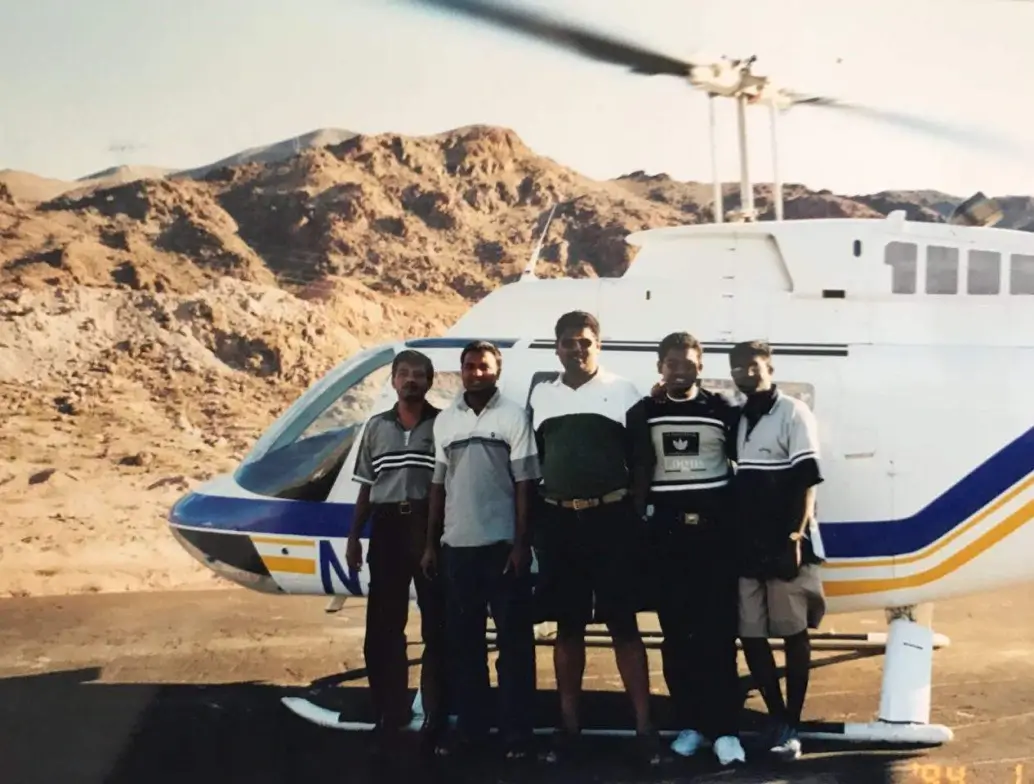
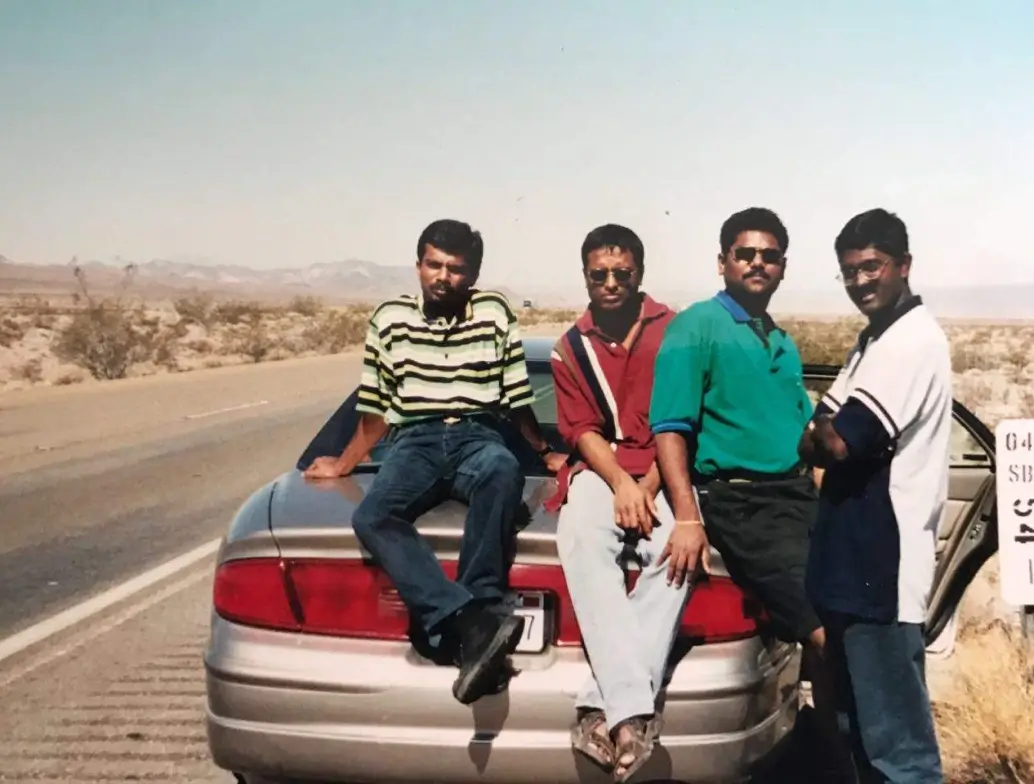
G’s Schooling at zoho
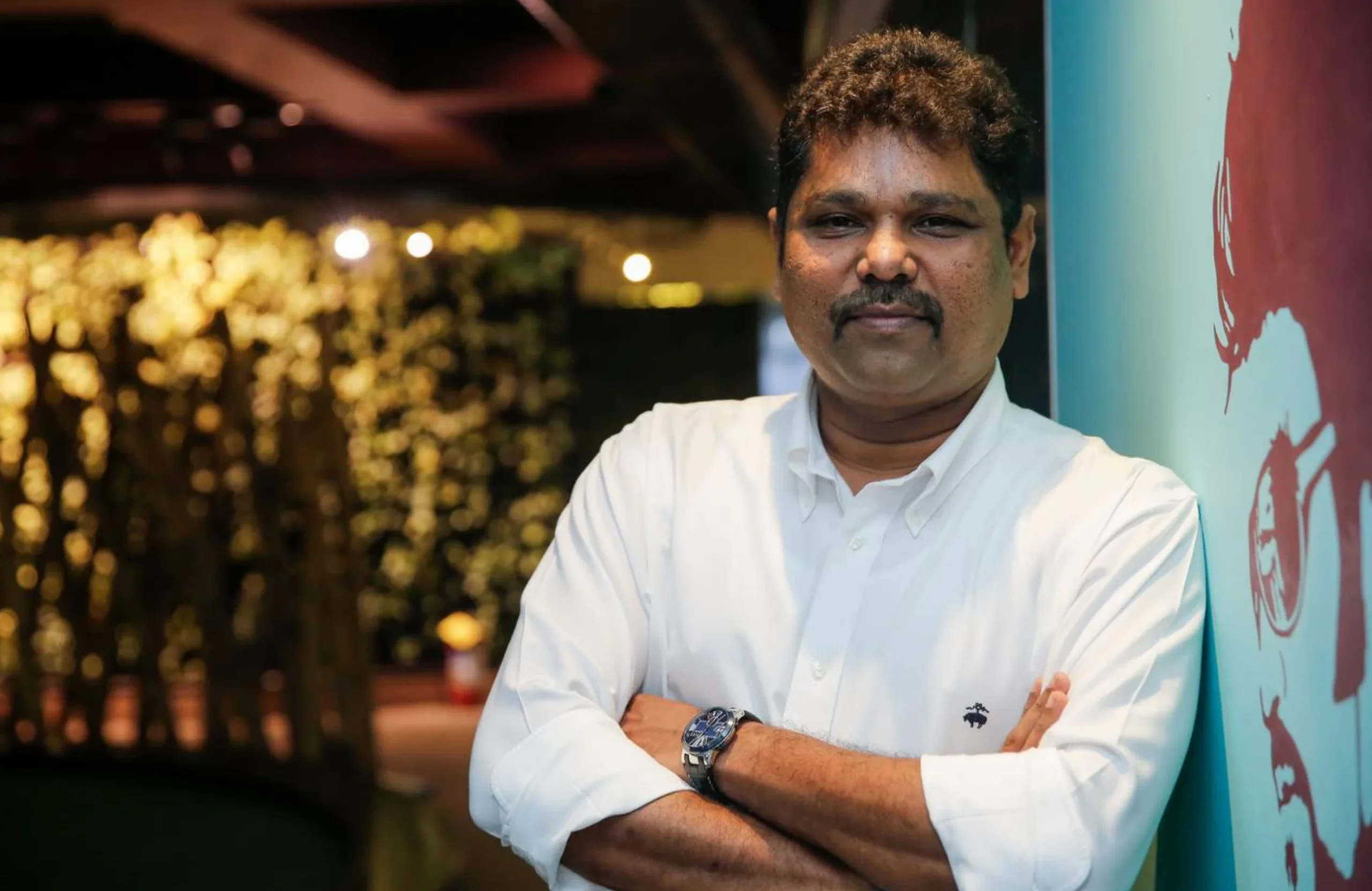
Much of who Girish is, and isn’t, can be attributed to his nearly decade-long career at Zoho, the 17-year-old software maker for small and medium enterprises founded by Sridhar Vembu.
Over the past decade, a breed of SaaS startups from India, led by Zoho, have established the country as a destination in this domain, giving birth to rivals for Salesforce.com, Zendesk and other global SaaS giants.
In the late nineties, Marc Benioff, the founder of Salesforce.com triggered the “software-as-a-service” wave, enabling enterprise customers to buy software as part of their monthly subscription plans, without making a big, deep hole in their pockets.
Since then, Salesforce.com has forced bigger incumbents such as Oracle, Microsoft and SAP to not only embrace the SaaS model, but also increase their focus on selling more modular pieces of software applications. The change has been so dramatic that today Oracle and SAP’s business model from 9-10 years ago — of selling expensive software licences and getting third-party service vendors such as Infosys or Wipro to maintain the software — seems to be from another era.
India’s small but growing breed of SaaS startups led by Freshdesk believe they can be the new challengers in the multibillion dollar global SaaS market, especially for small and medium business customers.
Indeed, by 2025, Accel Partners and Google believe Indian SaaS startups will be worth $50 billion and will earn $10 billion in revenue.
And there are two ways of building a successful SaaS startup. There’s the Zoho way, and there’s the Freshdesk way.
Girish’s stint at Zoho set him up to build India’s fastest growing SaaS startup. Girish values the experience at Zoho more than the first funding he received from Accel Partners. “That experience is what helped me build Freshdesk,” he says.
Kumar Vembu hired Girish at Zoho and is his mentor
Kumar Vembu, Zoho founder Sridhar’s younger brother, was president and COO of the company for over six years. He’s the one who hired Girish and saw him evolve as a product manager. “Every time I talk to him I feel he has become bolder in terms of the risks he wants to take. As people climb up (the ladder) they become risk averse, whereas I find him becoming more risk-loving as he grows up,” says Vembu, who started his career as a software engineer at Qualcomm, Inc in San Diego.
The Zoho-Girish journey
After his 15-month stint at HCL Cisco in Chennai, and some 13 months at technology consulting and training company eForce Inc as a software engineer in Texas in the US, Girish found a job at Zoho, then known as Adventnet.
The year was 2001, and there were job losses all around, triggered by the dotcom bust.
“I always hated negative environments, and wanted to run away from them,” he says. By early 2001, he was back in India to start a training company called MindSphere — the company Rajsekar and his other friends put money into — but within a few months it was clear that the nobody was interested in computer science.
He needed a full-time job, desperately.
“Also, I wasn’t married back then, so getting a job was important from that point of view. Startups were not cool back then,” he says.
He gave interviews at Oracle and GE, but none of them worked out. Finally, a cousin’s friend who was working at Adventnet referred him to the company and the interview happened in July 2001.
“The folks who interviewed me liked me, but the HR people said the salary expectations were too high,” says Girish. He had asked for Rs 4.8 lakh a year.
“Where do you see yourself five years down the line?” the HR manager asked.
“Someday I will start my own company,” he said.
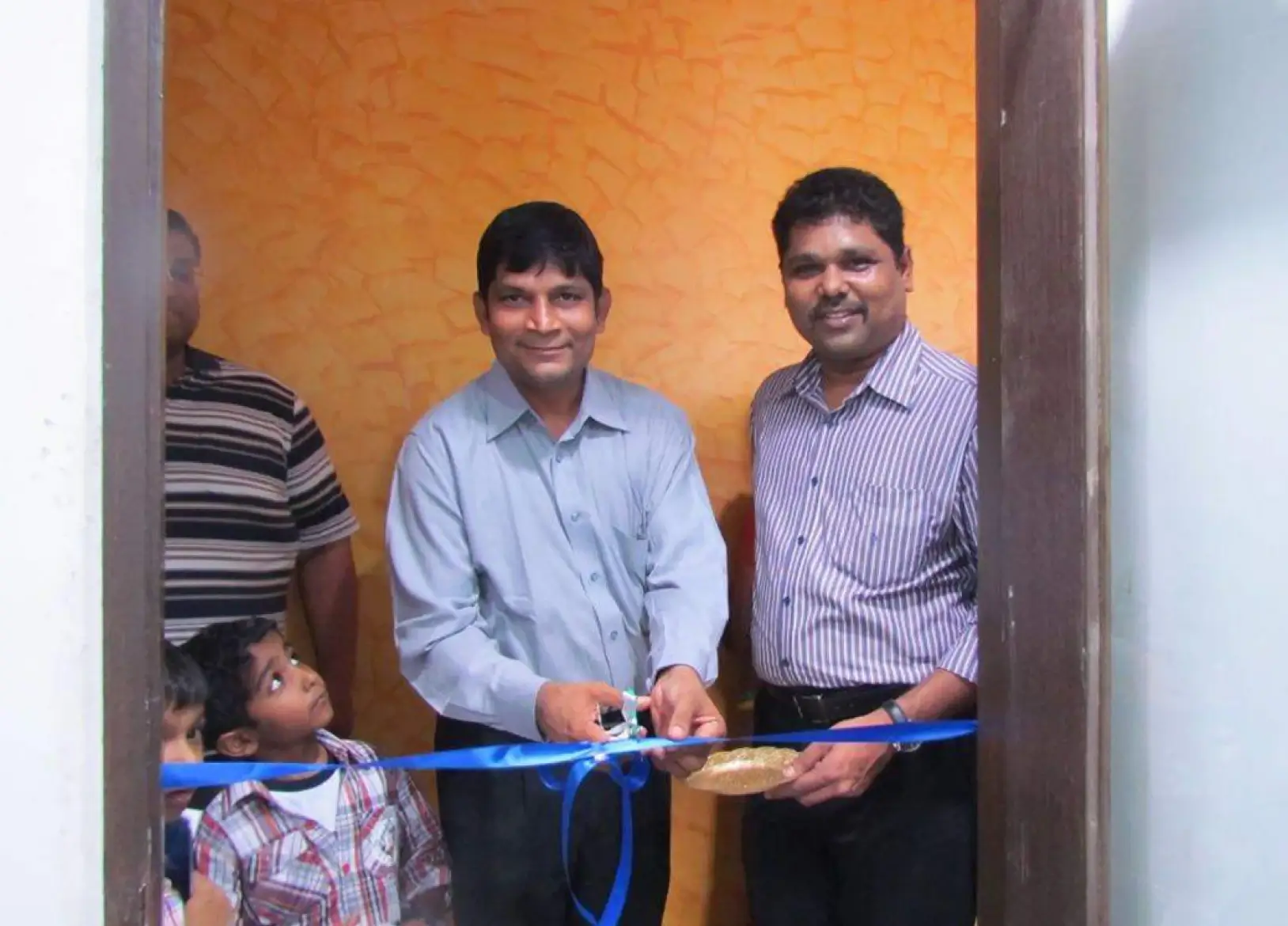
When the HR people told Vembu about Girish, he took a closer look at his resume and felt it suited a pre-sales role better. The role involved preparing pre-sales demos of Adventnet’s software solution for potential customers.
REBEL @ WORK
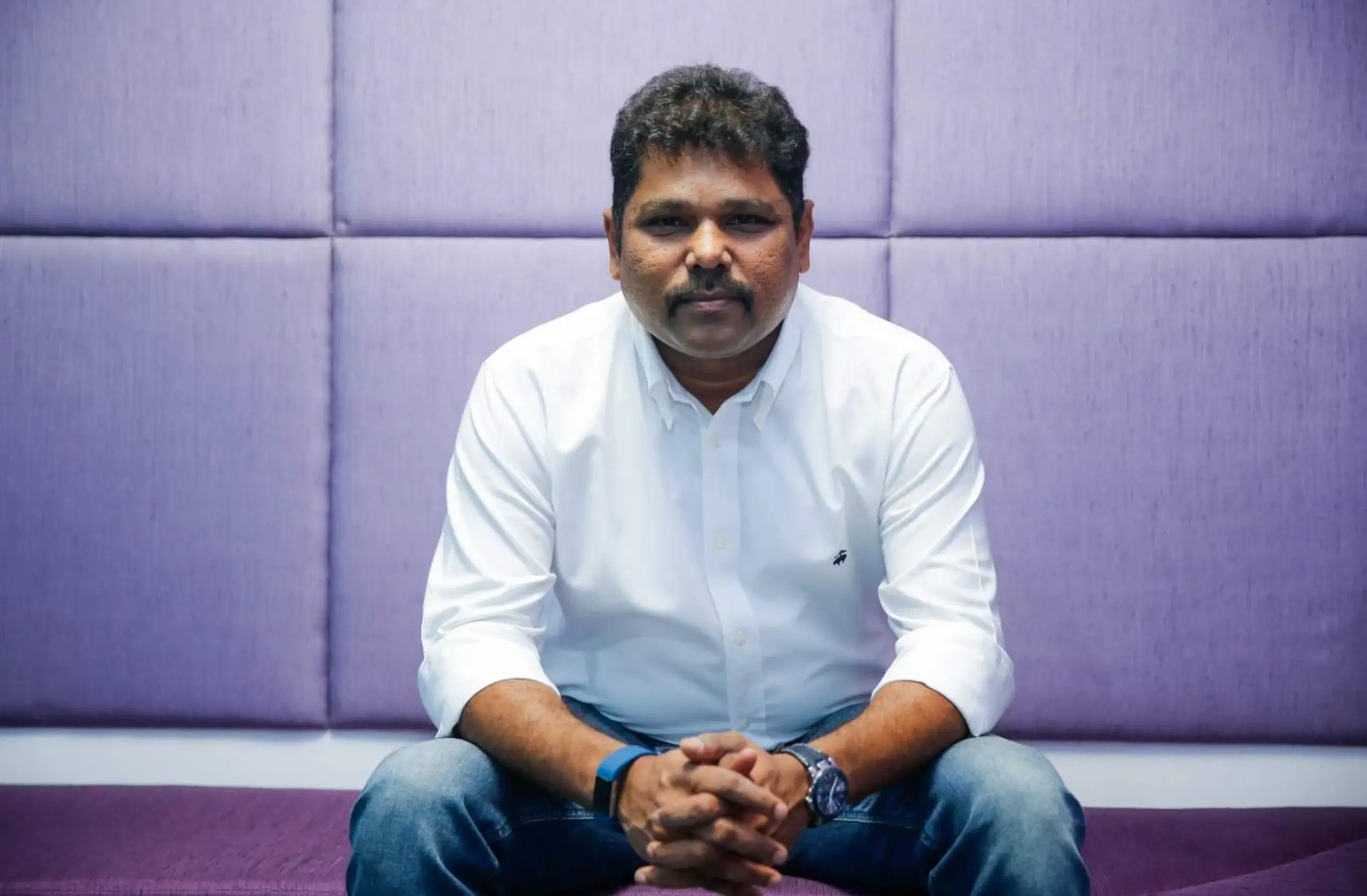
Back then, Zoho was (and still is) a serious company.
“We were very focused on work and had little time for fun. Girish took the initiative. We used to have get-togethers. He brought a cultural change in celebrating and branding an internal event. He created expectations around those events and upgraded their status,” Vembu recalls.
His rebellious nature aside, Girish was getting impatient at times with the Zoho way, which believed more in grooming inhouse talent for bigger roles, even if it took longer.
“There’s an impatience, a sense of urgency and aggression (in Girish). If I wanted to work on a five-year plan, he would want a five-month plan,” says Vembu. “His point was — once something’s decided, just do it. Why hire a fresher, train him or her for five years? Why not do it in five months?”
As Vembu contextualises, there’s no right or wrong. Sometimes patience is a virtue, sometimes it’s not.
But on his part, Girish always questioned. “Why are you not headhunting? Why can’t we go out and bring different people? But he respected us when he worked with us and went by our decisions,” says Vembu.
Why not this? Why not that? Don’t you think doing this in one year instead of two will help? Why do we have a no-liquor policy in office?
“I won’t call him a rebel though. He always accepted, whether convinced or not. He has an open mind,” Vembu says of “G”, as the Freshdesk CEO is called in his office and professional circles.
By 2010, Girish was getting really restless, and started thinking about building a startup of his own. The signs were there too — a generation of new age SaaS companies led by Salesforce.com, Zoho and Zendesk were beginning to go mainstream.
“Earlier, people used to ask me ‘ZO-who?’ Then we went from from Zo-who to being a respected brand rivaling Microsoft and Google. This meant the market was rising,” says Girish. “SaaS was clearly the future, but I was selling IT management software (ManageEngine).”
Girish was also ambitious, for the right reasons.
“Zoho never promised stock options. At some point in time, I thought I only had salary and a home loan. So, I thought i must build something on SaaS.”
The stars aligned for and shone brightly on the religious Trichy boy in the years since.
A LEAP CALLED FRESHDESK
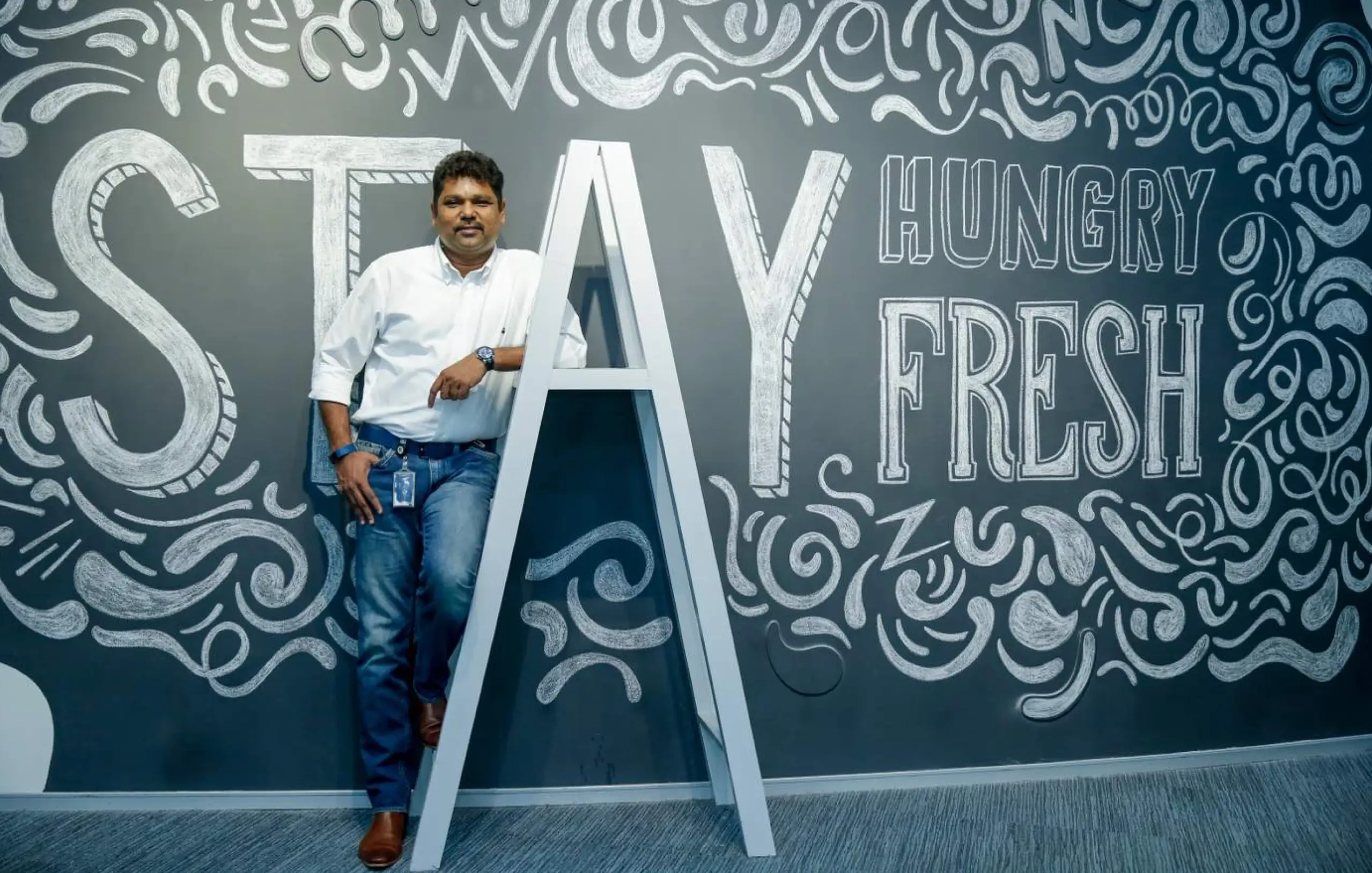
For all its mission to help solve customer complaints and manage them, Freshdesk was borne out of an angry customer review on Hacker News in the year 2010. As Girish himself explained in his company blog on March 18, 2011, a comment from an existing Zendesk customer complaining about pricing, and inviting “someone to come and take all of Zendesk’s customers”, triggered the idea of Freshdesk.
“That comment was like a slap on my face. Here was an opportunity sitting right in front of me. I had the domain knowledge and I knew that a massive transition to cloud is happening. The spidey sense in me told me that I should throw in my hat into the ring,” Girish wrote in the blog post. “The next few weeks were pretty stressful. I couldn’t sleep because of the excitement and the fear (school fees, home mortgage etc). I had not talked to anyone (not even my wife) about the idea, but I was researching all the companies in the space,” he wrote.
Girish then quit Zoho along with Shan Krishnasamy, who worked as a technical architect at the company before joining him in launching Freshdesk as cofounder and CTO. “Girish has always been a problem-solver and a businessperson; I am an engineer and this combination works,” says Krishnasamy.
It became clear that his research and efforts at putting together Freshdesk had hit paydirt when in December 2012, Zendesk CEO Mikkel Svane described Freshdesk as “A Freaking-RIP OFF” responding to a series of tweets from an analyst, who according to Girish was a paid blogger for Zendesk.
But we’re getting ahead of ourselves.
Let’s hear from Girish’s wife Shoba of the days leading
to the birth of Freshdesk:
“What do you think of the name Freshdesk?” he asked me one day in August 2010.
“What is this, it sounds like a juice company name? Who will name their company Freshdesk at all?” I asked, completely unaware of Girish’s startup plans.
He never said the name was for his own company or that he was secretly planning to build a new startup.
The morning of October 8, 2010 was the day he quit Zoho.
In the morning, he told me, “I plan to start a company.”
I was shocked, I was frying something in the pan… I immediately switched off the gas and came back to him.
“Why all of a sudden? Everything is going good, why do you want to do this?”
“I will answer all the questions later.”
“You aren’t quitting the job, right?”
The answer came when he arrived home early in the evening. “I quit Zoho.”
I was shocked again, didn’t know what to say. So many things running inside my mind, we had just booked an apartment, had two kids, and I was not even working.
The biggest concern for me was what will people say. How will I explain why he quit the job when everything was going good?
A few days later, he assured me that if the startup fails, he would return back to a mainstream job. He also explained the product and the market, which I didn’t understand much.
What I still remember the most about the reason for building Freshdesk is that Girish wanted every future employee to have their own BMW cars, someday.
I didn’t know what market he was targeting or the product he was building, but this thought and sense of purpose made me feel really happy.
Life took a turn from that decision onwards for the family and there were early disappointments.
He would never take us out, the kids used to feel bad.
We had to return our Honda City back to Zoho because it was on company lease. The kids were used to ample leg space, but we couldn’t afford a big car back then and we had to buy a Ford Figo.
Girish (who stands at 6 feet-1 inch and is heavy set) looked awkward behind the wheels of a Figo. This particular scene is embedded in my mind like a shot from the movie Incredibles — a huge gigantic guy driving a really small car; Figo was very small for him.
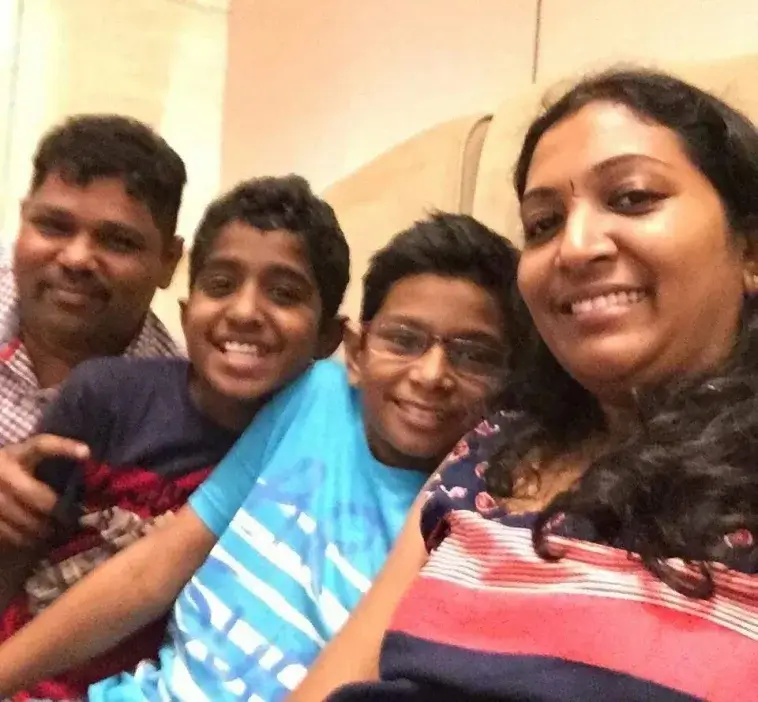
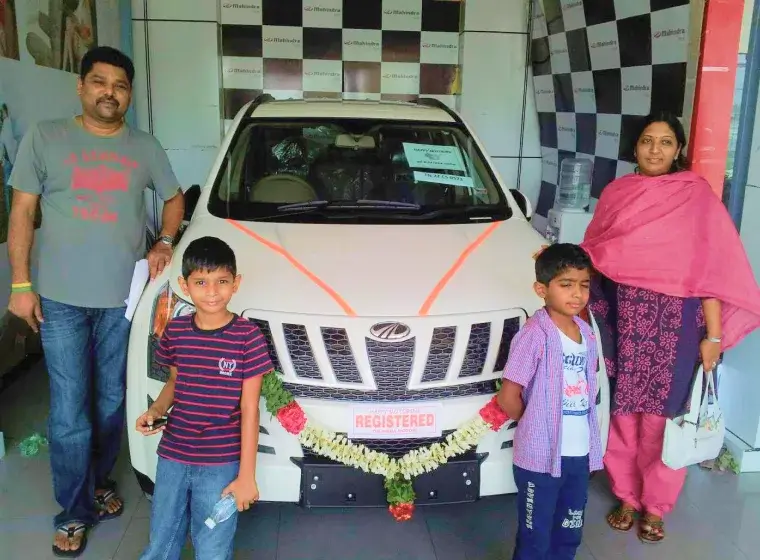
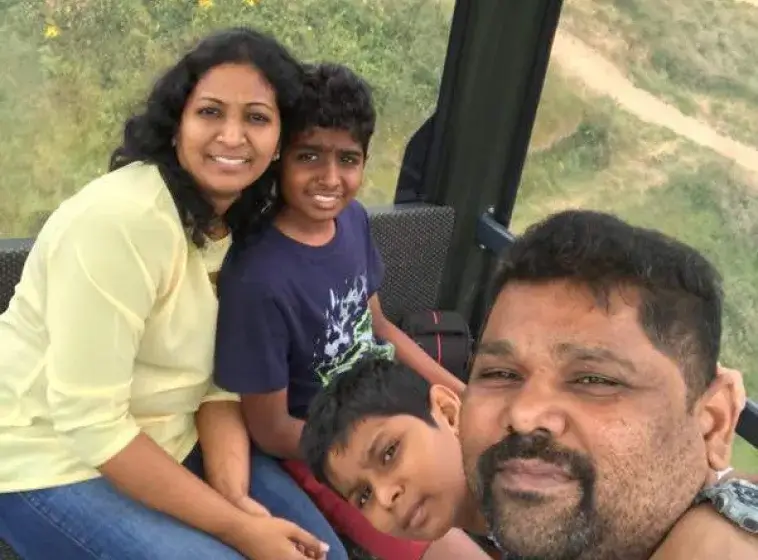
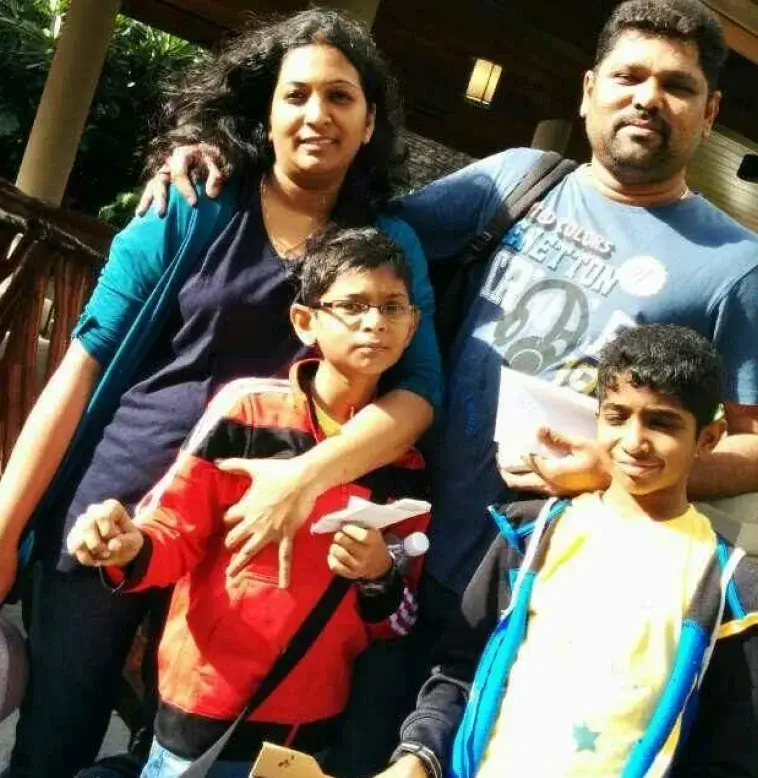
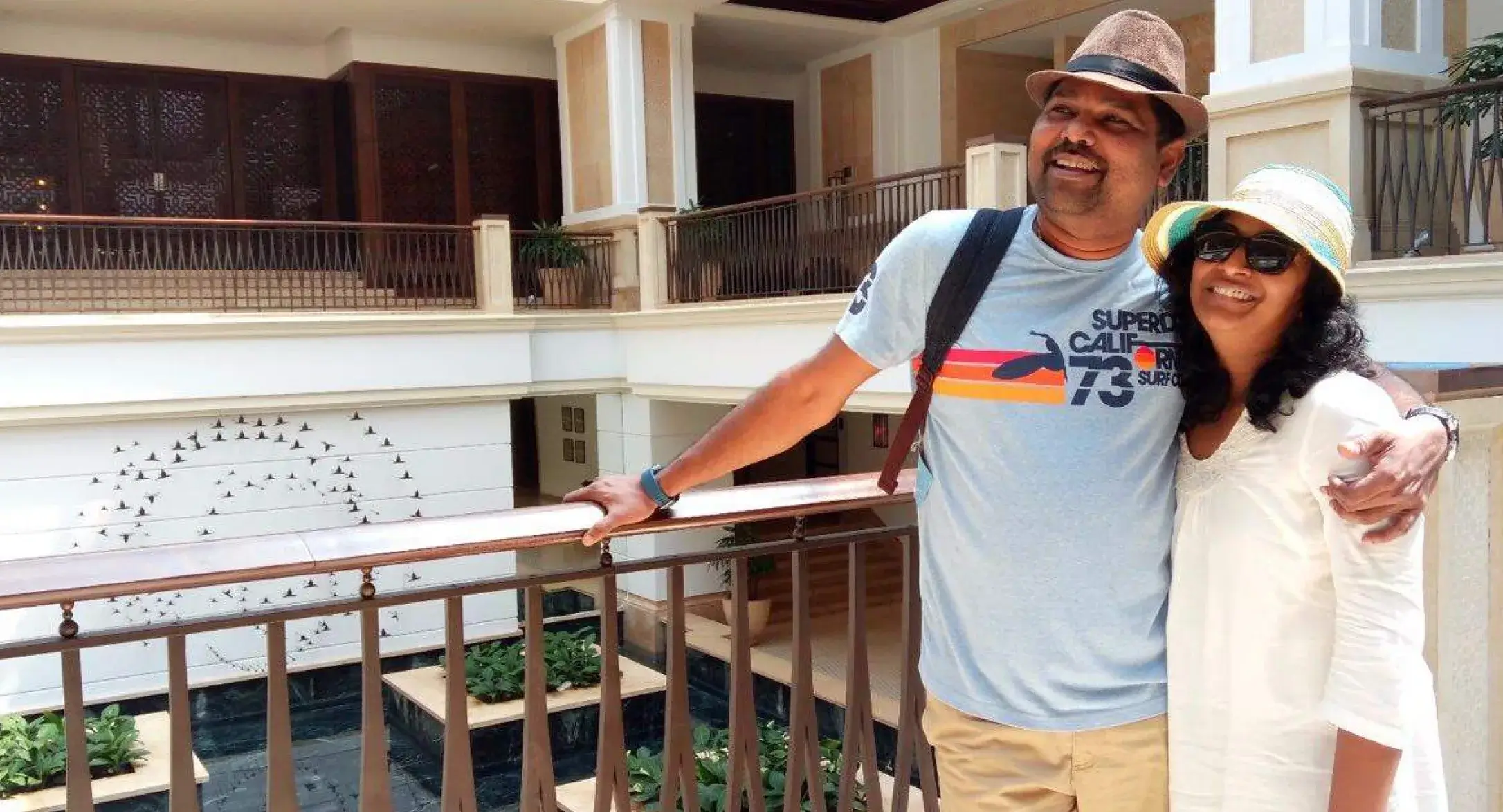
Girish, the storyteller
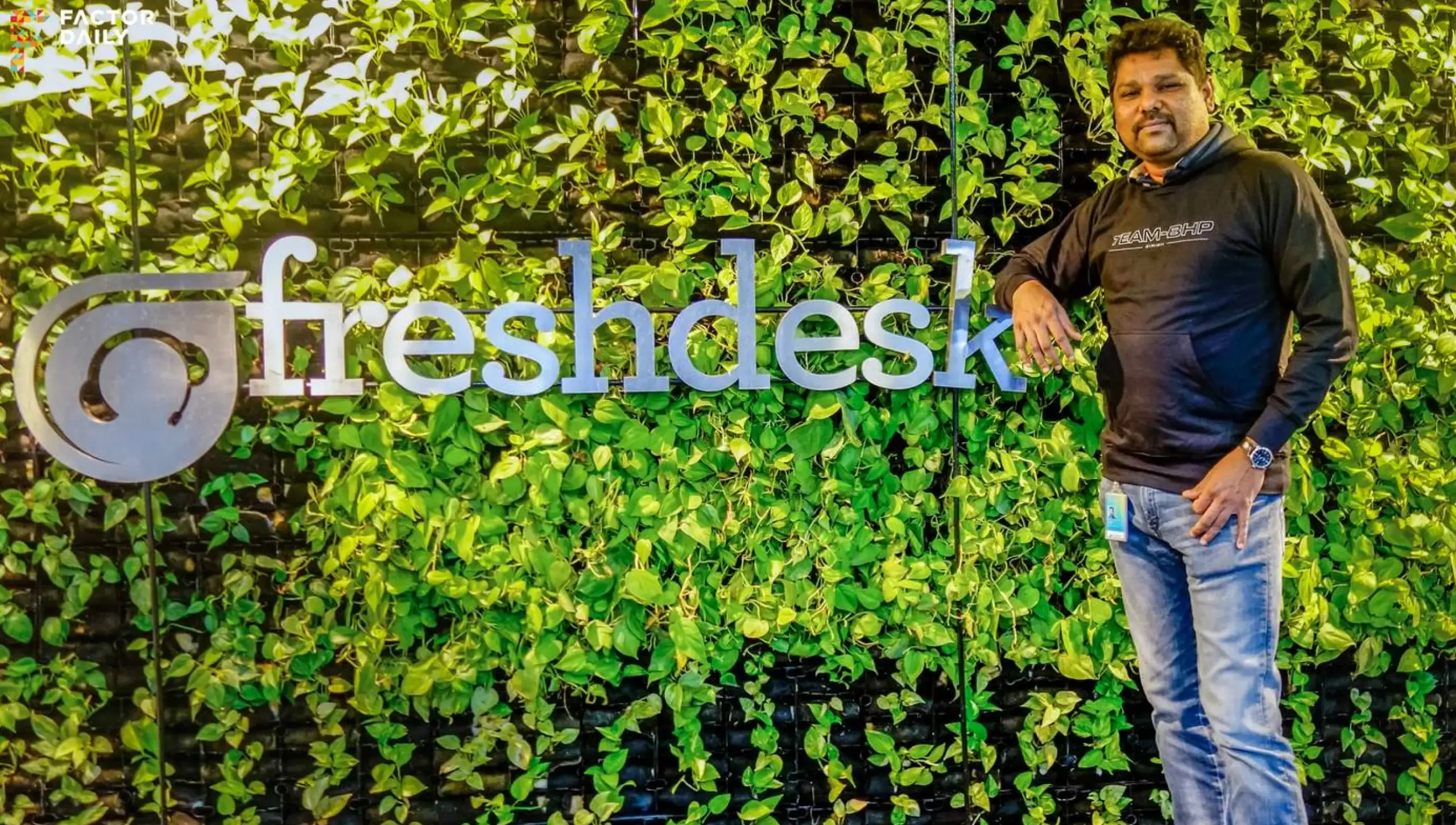
Shekhar Kirani was still searching for his first deal as the first-time venture dealmaker at Accel Partners when his colleague Anand Daniel mentioned Freshdesk. (One can never repeat disclosures too often, so here’s it once again: Accel Partners is one of the three investors in SourceCode Media, the company that owns FactorDaily. It or the other investors have no say whatsoever in our journalism.)
“There’s a new SaaS startup in Chennai led by an ex-Zoho employee; you want to take a look?” Daniel asked Kirani.
Kirani first decided to ask around. As he admits, he’s not an investor to make a decision based on pure guts. “I believe in analysis and deep research before deciding on giving a term sheet,” he says.
He turned to a former classmate and a former product manager at Zoho, Krishna Sanjeevia. “What do you think of this guy Girish?”
“Really strong product guy, (he’s) respected. But be careful because (Sridhar) Vembu may come after him,” Sanjeevia told Kirani. “Make sure there’s a clean departure (in terms of no-compete clauses), be careful.”
He hopped on a plane to Chennai sometime in January 2011, and went to check out Freshdesk.
The first thing that hit Kirani when he climbed to Freshdesk’s 700 sq feet office in a place called Kilkattalai in Chennai was the furniture.

“They had really “mixed” furniture — the chairs didn’t match table, which in turn didn’t go with other stuff in terms of colour and design,” he recalls.
“But all six of them had big Macs. It signalled to me that the guys knew where to spend money,” he says.
After a few weeks, Girish met Sameer Gandhi, a partner from Accel’s San Francisco office, in Bangalore when he was visting on a business trip.
“If he had walked into my office in the Valley, I would have ensured he walked out with a cheque,” Gandhi told Kirani after the meeting. In particular, Girish’s storytelling, combined with the market opportunity to disrupt an established incumbent like Zendesk, impressed the early investors.
Let’s hear the investor story from Kirani:
Looking back, every entrepreneur needs multiple skills at different competence levels — product, sales, marketing, team building and so on. So far, you tend to see entrepreneurs slightly above average in most of these skills, but in one skill, they will be exemplary.
Girish was above average in many skills, but he was exceptional in product understanding, from a user’s point of view. He wanted to make a helpdesk simple and easy to use.
In Girish’s mind, there are two kinds of entrepreneurs — one focused on product and the other exceptionally talented on the marketing front. He’s allergic to field sales force. He is also allergic to detailed numbers. He is allergic to Excel sheets.
When he crossed $1 million in revenue, there were massive celebrations. When he crossed $50 million, that expression of joy was different, as if he knew already it was coming.
When he started, he didn’t know how big this could get, he didn’t know how big he would become. When they hit $5 million, the realisation that this could become big hit him.
Despite the growth (Freshdesk’s revenues from its over 80,000 customers were about $70 million in the year to March 2017), he told me last October how small the company is really. This was after we watched MS Dhoni for which we drove Milpitas from Palo Alto. The number of companies of that scale in the Valley are too many, and the likes of Salesforce.com dwarfs them all.
I had met him for dinner three-four months prior to that in Bangalore. “What do you want, Girish?” I asked him. He was crossing the threshold of the toughest valuation for a startup — $500 million to $1 billion.
“Most companies can exit below a $500 million valuation. If you cross that, the number of companies who can buy you is far fewer. Once you cross a billion, there are other options like a merger or even an IPO.”
“What do you want to do? You want to play or exit?” was my question.
Girish has a habit of answering questions by asking a question back. “What would you do, Shekhar, if you were in my shoes?” would be his usual answer.
In this case, he never asked the question.
Girish has changed, I thought. I noticed that he felt like going for the big one. Every month there are interests coming our way, camouflaged, exploring a deal.
I asked if he’s looking for an exit. He said no.
If he leaves Freshdesk and I gave him the same million dollars, he won’t be able (to build another Freshdesk). The context of the market has changed. In my own life, I have seen that things have to come together — the market, competition, team and so on.
“If you have to recreate this, Girish, I don’t know if you can,” I told him.
That was the moment when he decided to stay the course.
The proof for Kirani that Girish is onto big things lies in customer experiences such as those of Saravana Kumar, the founder of the Kent, UK-based software analytics company BizTalk360, Freshdesk is the platform on which his entire business runs. Kumar switched to Freshdesk from Assistly (acquired by Salesforce and now called desk.com) in 2013.
“We had some bad experiences with Assistly that time, mainly around parsing email replies. Once the email thread goes on multiple cycles, it became nearly impossible to read and respond with Assistly email editor. We started looking for alternatives and found Freshdesk promising. We made the switch and never looked back,” says Kumar.
Launched in 2011, BizTalk360 has over 500 customers in 30 countries. Back home, in the Indian market, Lenskart.com, the online eyewear company, turned to Freshdesk in early 2015. One of the pain points addressed by Freshdesk (and its new age rivals such as Zendesk) is ensuring customer support and engagement in the challenging world of social media where even the slightest of problems gets amplified with emotions.
Customer helpdesks offered by the likes of Freshdesk, Zoho and Zendesk assign a unique “ticket” to each complaint or issue and ensure it is tracked and solved in a time-bound manner. Also, with different divisions of a company trying to solve customer issues, there can be confusing overlaps all the time with no clear visibility about the overall situation.
Freshdesk not only automates the entire process of helpdesk and complaint management, but also provides a single, unified view across the company.
“We decided to go ahead with Freshdesk in early 2015. Before that we were using our own in-house ticketing system in which no department had visibility into ticket pendency; it was very difficult to find out who all have actioned on that ticket,” says Nitish Singla, a product manager at Lenskart.com.
The future for thalaivar, his startup, and his family
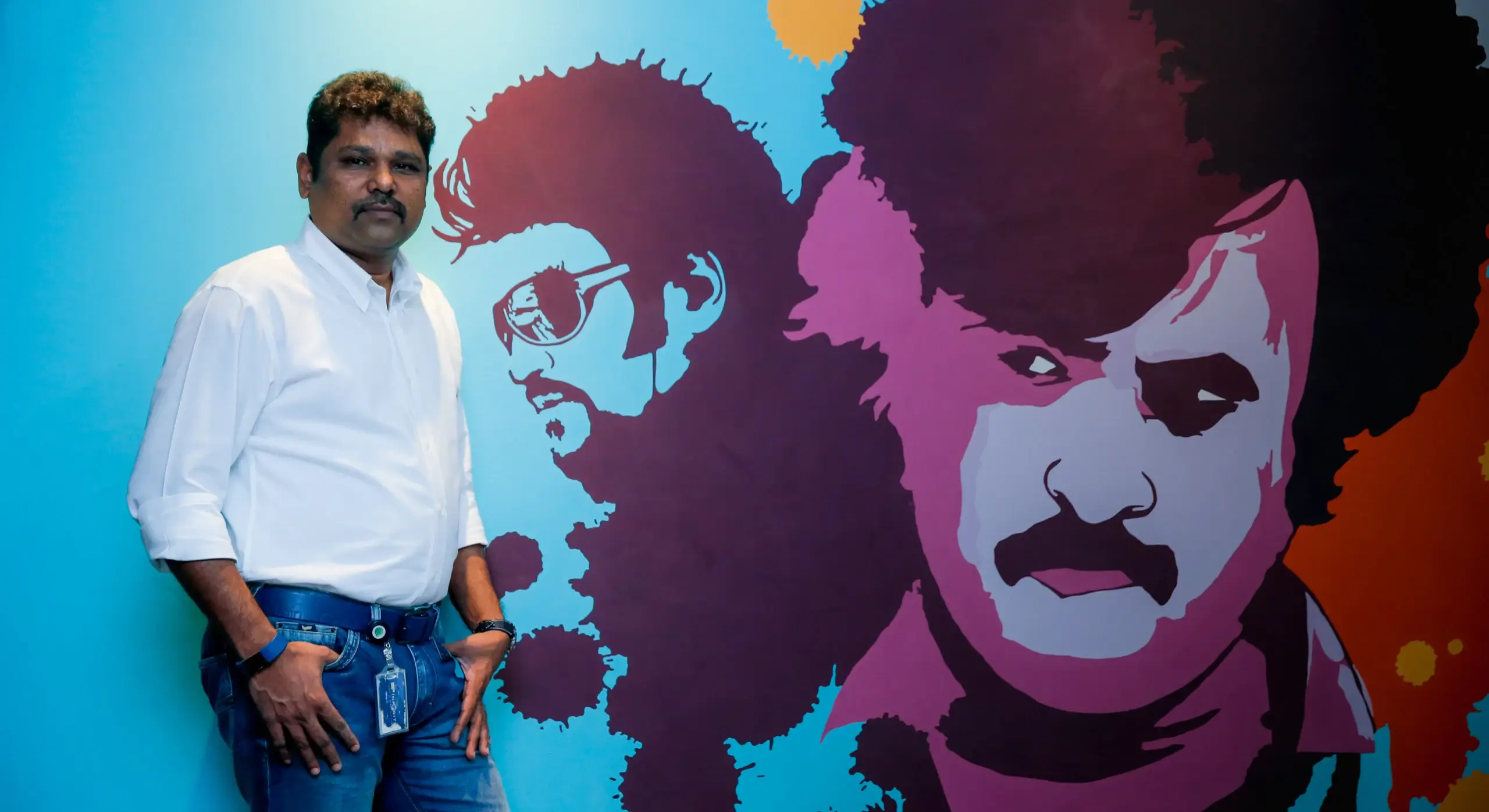
“We started as the number 605th helpdesk in the world. What helped us in 2011 is hurting us now as some started seeing us as an ‘affordable Zendesk’,” Girish told a gathering of some 50 entrepreneurs meeting at a five-star resort in Mahabalipuram on the outskirts of Chennai.
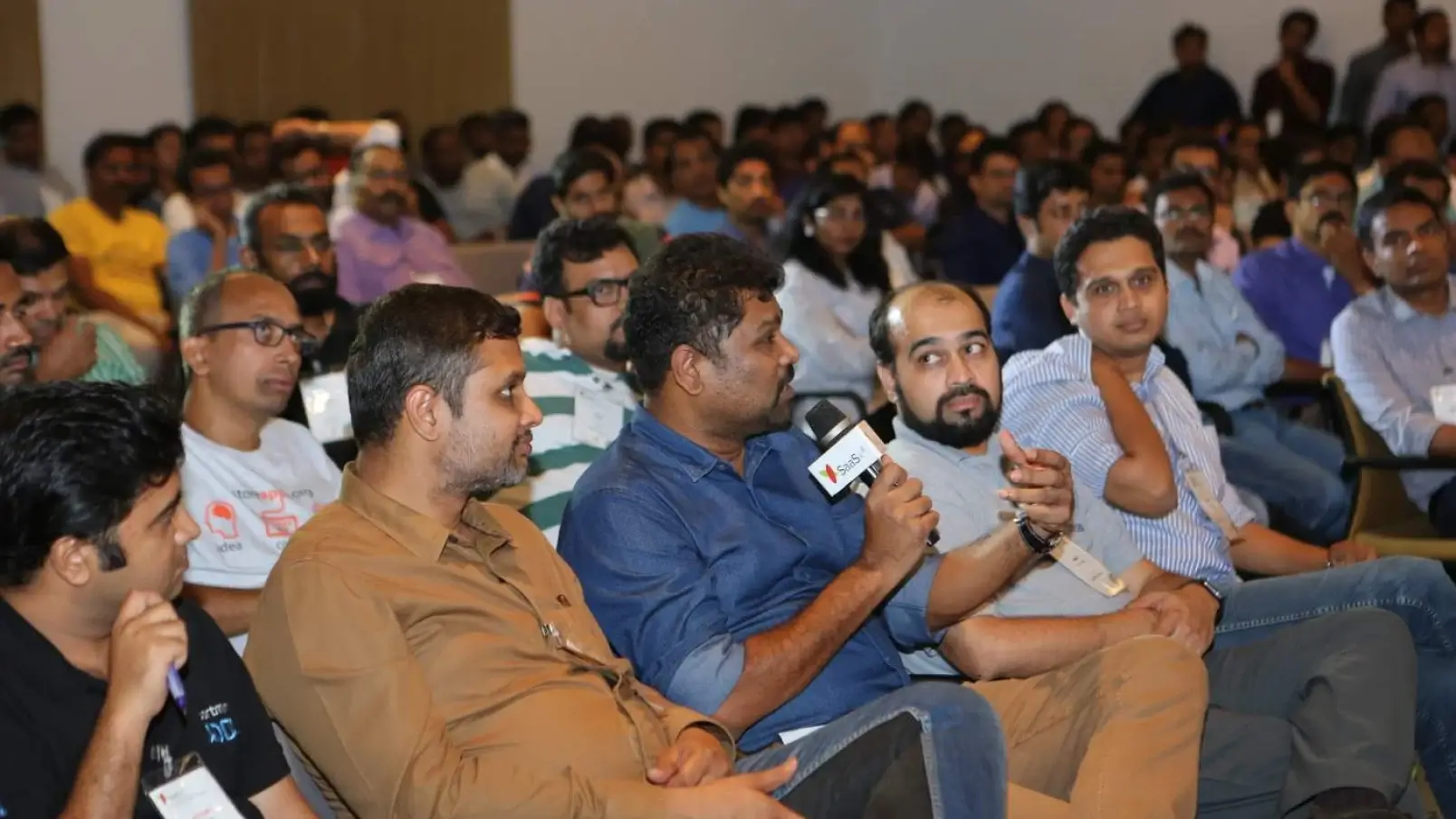
That is among the smaller challenges before Freshdesk. In every startup’s journey, the first year is always crucial. The second year after the first funding and little cash flow is considered the “valley of death.” For Freshdesk, those risks aren’t there anymore, but the challenges it faces ahead are far more existential, and the stakes are much higher. For investors backing the company, anything above $500 million in valuation is considered the “toughest exit value” for a startup.And then, there are leadership and organisational challenges staring at the founder.
When Freshdesk hired former LinkedIn and McKinsey top talent Nishant Rao as its COO in November 2015, it was seen as a strong sign of growing the company in a more structured manner. In March this year, however, Rao decided to move on, citing personal reasons.
“The most important hurdle will be ability to find the next level of leader to join the team… the game will get bigger,” says Manav Garg, founder of Eka Software, a commodity trading software maker backed by Nexus Venture Partners and Silverlake.There are still questions about how Girish will build the next rung, especially after Rao’s exit. “Many of us have been watching to learn from how far could he work with an external, high profile leader like Rao. Rao’s departure also raises concerns about G’s ability to work with such leaders. It’s clearly a work in progress,” says a Freshdesk employee requesting anonymity.
Girish describes his leadership style with “the buffalo in the ditch” analogy. “If there are several buffaloes fallen in different ditches, what do you do? Do you make statements about how can all of them be taken out at once? Or do you focus on getting them out one at a time? For me, it’s the latter,” he says. He uses analogy to illustrate his bias for action.Rao says there are two key challenges Freshdesk faces from hereon.
“When you think about how far we have come, to me the main thing we must get right from here on out is mostly world class execution,” says Rao.
According to Rao, the two key challenges Freshdesk and Girish may face are; building out the instrumentation necessary to make data-driven decisions (becomes critically important at scale) and ensuring the leaders and teams don’t “settle for good versus great.”
“For example, with all the celebration and awards of last year (2016) most companies may be lulled into a false sense of security that everything is awesome…but now that our main competition is the global big boys, it is imperative that we dig deep, continue to embrace change & up our game,” says Rao.
Where does freshdesk stand Against its Rivals

Zendesk is valued at
$2.7 billion
with revenues of over
$200 million

Zoho has revenue of over
$300 Million
and is privately funded

Salesforce.com has market cap of
$58.66 billion
revenues of
$6 Billion
Copycat Freshdesk?
As an executive at a rival points out, Freshdesk also needs to find a new positioning, beyond just being a competitor to Zendesk.
“Originally, the idea was that every year Freshdesk will close the gap with Zendesk and create value. But it is not closing the gap anymore. It is now looking at the Zoho model of having multiple products. Now, he (Girish) needs to reimagine his strategy,” says the executive, requesting anonymity.
But the strategy sits pat with Girish. SMBs like to have one vendor to buy everything from, he says. “We have Freshdesk, Freshsales, Hotline (in our product line-up) currently. Each one of them is in a different trajectory. There are two ways to build a $100 million revenue company — you can either have one product that brings all that revenue or have different products (taking aim) at $50 million each, and in few years you have $200 million from four such products.” His salespeople land 20 to 25 deals a month at one-eighth the cost at US rivals.
“The secret sauce is that US companies can’t sell to SMBs profitably, they don’t care about that market. So, we serve that market well. This is not easily replicable. We are hunting for deers, not the elephants,” says Girish.
His allergy, as Kirani describes it, to Excel sheets is a weakness at the company, for sure. Girish and his salespeople make up for it by aggressively chasing and bringing on new customers. Freshdesk is already at 1,00,000 customers and is targeting 2,00,000 by 2019. Instead of making it “an Excel sheet mission,” he believes in going out and signing up businesses.
This is fine at a time when the business for companies like Freshdesk is strongly pivoting towards India. As Nikesh Arora, who served as president at Google and Softbank, said in a 2010 interview when he was still at the search giant: “When you drink from a hosepipe, you don’t worry about your shirt getting wet. You drink as much as you can. You dry your shirt later.” When Girish gets down to fixing Freshdesk’s processes, he will face the task of changing habits hardcoded as the company’s DNA.
Kirani calls his leadership a “work in progress”. “He (Girish) has to find someone to plan for the next level. He has been investing in internal leaders, and has built a level in markets such as Australia”, he says, cautioning that it’s not an easy structure to put in place given the complexity across functions, products and levels of leadership.
“A CFO, chief revenue officer are among the next roles being planned,” he says. “He is never comfortable with (running) field sales. He would rather hire someone than do it himself.”
What will happen to Freshdesk if Girish is hit by a truck, I ask Kirani. “Right now, he’s very critical (to the company). If he takes a six-month sabbatical, sales and other engines will run smoothly, but product and culture will be hit the most. He is the chief product officer and culture is something he doesn’t want to outsource to anyone,” says Kirani.
Girish’s subliminal need to be loved by all translates into yet another tough goal for him at the workplace. “It’s relatively easier to build a company loved by shareholders, there are enough examples,” he says. “But it’s much harder to build a company loved by employees, customers and shareholders. That’s why we love companies like Google: customers love the product, employees love the culture, and shareholders get the value. That is a dream for me personally to focus as much on that front.”
On Glassdoor, a job listing site that allows employees to rate their employers anonymously, Freshdesk’s overall rating is 4.4, with 97% of the 78-odd reviews approving of the CEO. In comparison, rival Zendesk’s overall rating is 4.5 with a 95% approving of CEO Svane. To be sure, such ratings do not accurately reveal what employees think of their leader, but they are indicative.
the curse of a
startup founder
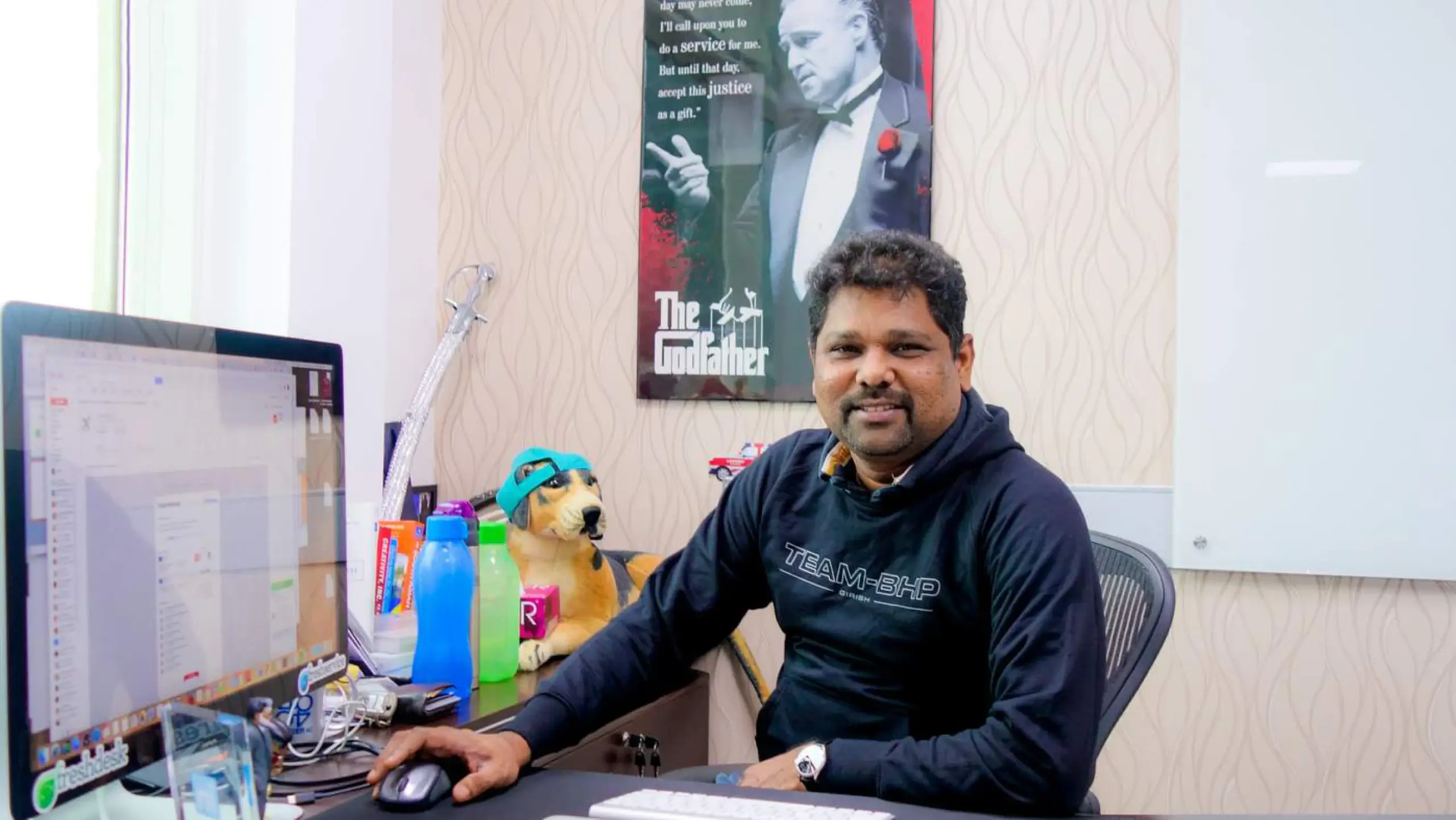
What about Shoba, Charan, and Sanjay, the three most important loves of Girish’s life?
“As an individual, he used to be busy, now he is super busy,” says Shoba.
“Initially, I used to complain that he’s not spending time with us. If I got angry, I would change his display name on my mobile phone. If I got very angry, I would change his name on my phone to ‘disappointment.’ When I am angry, and he’s calling on phone, it shows as ‘disappointment’. Another name I use is ‘Do not disturb’.”
“I wish he had more time to spend with his sons… me,” she says.
One recent episode brings a smile to Shoba’s face. Earlier this year in January, Girish’s dreams as “a Rajini fanboy” came true. He met his idol of all these years — Tamil actor and superstar Rajinikanth. It’s not that he didn’t want to meet his idol all these years; it’s just that he wasn’t sure if his efforts to meet Rajinikanth would fructify. “I always play to win. So this time, thanks to some connections I had made, I was confident of getting the meeting, so I went for it,” says Girish.
But, when he met Rajini on the morning of January 8 together with his family, he froze (he wrote a Medium post the same day). When the superstar asked Girish about Freshdesk and how it started, Girish couldn’t repeat the story he has narrated hundreds of times, over and over again, without any stops. “Look, Appa’s hands are trembling,” his sons pointed out to Shoba. “Girish was blabbering, he didn’t know what to say. He’s never like that. We had never seen him like that,” she says.
It’s strange and fascinating at the same time how the families of entrepreneurs look at startup exits and funding rounds. For them, as Sobha points out, any good outcome will have to translate into more time for the family. Exactly what Naval Ravikant, the founder of AngelList pointed out in this episode of Outliers Podcast this February.
“The most important thing we have in life is time. I guarantee you that if you’re a smart entrepreneur, you will die with money in the bank. What you will keep wanting is more time, not money,” he had said. Sage advice for Girish.
From the lanes of Trichy where he spent his childhood, and the coaching centre he ran to where he is now with Freshdesk, Girish Mathrubootham has come a long way. He possesses all the things he always craved for, or was denied during the struggle of his career. He has love of a close family that he missed in his childhood. He has the pride of building a company likely to be valued in a few billions, if not more.
The question is: can Girish make all this count?
Edited by: Josey Puliyenthuruthel
Images: Rajesh Subramanian
Charts: Nikhil Raj P
Personal photos courtesy: Girish Mathrubootham
Disclosure: FactorDaily is owned by SourceCode Media, which counts Accel Partners, Blume Ventures and Vijay Shekhar Sharma among its investors. Accel Partners is an early investor in Flipkart. Vijay Shekhar Sharma is the founder of Paytm. None of FactorDaily’s investors have any influence on its reporting about India’s technology and startup ecosystem.




